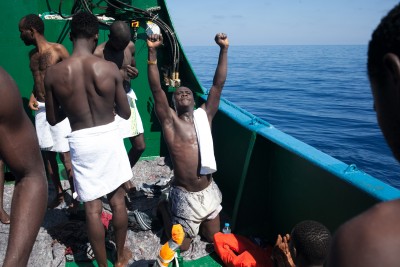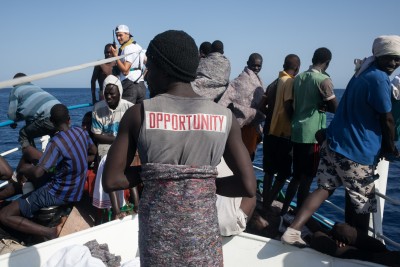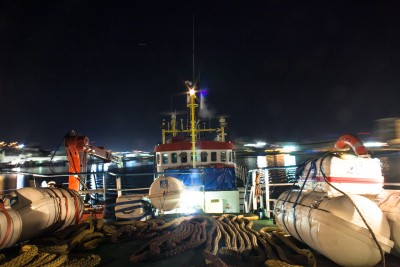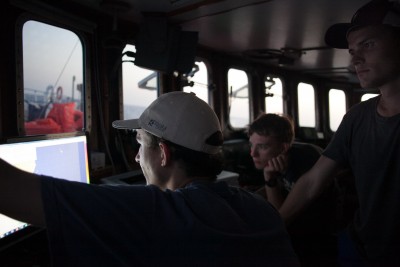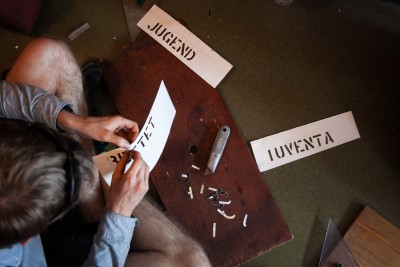IUVENTA
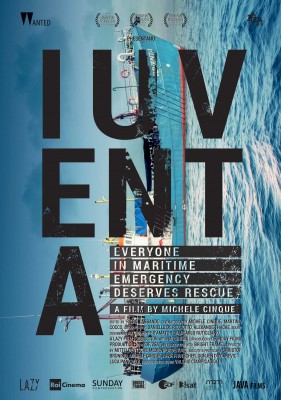
Sinopsys
The documentary film Iuventa relates the events of a crucial year in the lives of a group of young Europeans all involved in different ways in the Jugend Rettet humanitarian project, starting from the first voyage of the Iuventa ship in the Mediterranean Sea to the heavy accusations that led to the seizure of the vessel more than a year later. The claim of the NGO is that they are not the ones who have to do the job; they start the operations to demonstrate that a search and rescue program at sea is mandatory and is a moral duty for Europe.
The backbone of the narration is the ship’s first trip out to sea: setting sail from Malta, she comes back to La Valletta after 15 days offshore, having saved the lives of over 2,000 people. After the first mission the film takes us to Berlin and in Italy in the months following the first voyage, through the winter time when the future of the Jugend Rettet is discussed. The film, precisely because of the particularly young age of its protagonists, becomes the tale of a sort of training period: finding themselves at the forefront of this horror and death, and conscious of the vastness and complexities of the correlated socio-political problems, these youngsters start having doubts about the sense of the whole project which, it appears, determines in some way the loss of their innocence.
Director’s note
The first time I heard about the Iuventa was in the spring of 2016 when the Jugend Rettet, founded in 2015 by Jakob Schoen and some other twenty- year-olds from Berlin, launched its programme of action. The Iuventa had been bought the year before by this newly-found NGO to rescue those who were fleeing from wars, famine and dictatorships across the Mediterranean Sea, as well as to show the European institutions that a serious sea-rescue programme is not only a question of moral duty for a country that proclaims itself to be civil but also that it is economically viable.
In the late spring of 2016, the Iuventa (originally a fishing-boat of little more than 30 metres converted into a vessel to be used for rescue operations) set out from
the harbour of Emden in Germany for Malta from where it would then embark on Search & Rescue operations. Right away I fell for the story, immediately perceiving its importance both from a real and a symbolic viewpoint. All the elements were there: the remarkably young age of the protagonists, the utopian outburst of passion, the desire to change the world, a great force of determination which, foreseeably, was bound to clash at some point with harsh reality. And so I called the group of young guys of the Jugend Rettet. Ten days later I was in Malta and a couple of days after my arrival, on board the Iuventa for its first mission. I had imagined that only by going on board ship I would have been able to film and narrate the emotions of these youngsters as they saw with their own eyes the results of over a year of preparation.
After the Iuventa’s first mission at sea I went back to Germany with Jakob Schoen to film the return home. Despite the many hours of filming, both on board the ship and on the first journey to Berlin, I strongly felt the need to delve deeper into the story. I wasn’t interested in the sensationalistic aspect of the rescue operations at sea but rather in trying to better understand the protagonists of this humanitarian operation: their dreams, their hopes but also their disappointment. This journey took me in Sicily where three of the protagonists went to meet the guys they rescued after 6 months from the mission, this journey was very important for their growth and at the same time very intense and moving and become an important narrative step of the film.
Thus, I came to construct this narration, following the story for about a year and half up until the seizure of the vessel in Lampedusa in August 2017.
The Iuventa documentary, unlike my previous films, is not focused only on one single character, is a collective story and the ship became somehow the main character of the film. Unlike my previous film was a project in which reality overcame dramatic writing: I never had time to develop a screenplay before I entered the editing stage. Iuventa has been a project in which the improvisation and the adaptation of the camera to the reality become the narrative style.
As director of this film, even if I have made other films in the last few years, it’s as if it were my first time. I came back to the basics, finding myself personally behind
the camera, finding myself alone in facing a complex and painful reality and having to filter this in a narrative form. The film arose from the conviction that it was necessary to tell this story, and the subsequent decision that I wanted to do it myself.
The narrative structure starts from the sequences filmed live with the protagonists of this story in an observational style. The span of the year and half in which the story is filmed passes from the summer atmosphere on the boat to the snow on the ground in the Refugee Camps in Italy. The editing process was key in building the narration, due to a huge amount of footage collected during the filming stage. With the editor, Piero Lassandro, we realized that the live sequences filmed with the protagonist were strong enough to build the structure of the film from it, without resorting to interviews or any other fictionalized element. I wanted to give back to the public the feeling of naivety and braveness of this story as pure as possible, creating a narrative structure from raw reality.
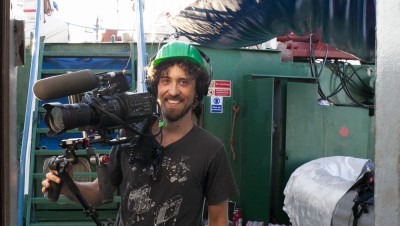 Director’s bio
Director’s bio
Michele Cinque, born the 27th of March 1984 and graduated in Philosophy at ‘La Sapienza’ University of Rome, has been working in film production since 2004. In these years, he directed several documentaries and television series, including “Xlife” a 10-episode series on extreme sports broadcasted in Italy, France, Finland,
Hong Kong and Macau. He directed the documentaries “LavoroLiquido”, about the Italian world of labour, awarded as Best Documentary by Imaie, and “Top Runner”, awarded at FICTS 2009 and at Palermo Sport Film Festival 2010, “Bob Marley, The Reggae’s Prophet”, presented at Fipatel 2012 and broadcasted on Rai2, the
documentary “Mr. Jazz”, dedicated to Louis Armstrong and coproduced with Rai Storia. Since 2015 Michele Cinque is working as a correspondent from South America for RAI Italia, producing over 100 episodes for the format Community.
In 2015, he founds ROMAP, Roma Light Interactive festival, that in two years has gathered more than houndred thousand people in the city center of Rome for its
spectacles of lights. His last film, “Sicily Jass” has been presented at 2015 Festival dei Popoli, 2016 New Orleans Film Festival, 2016 Mimo Brazil, 2016 Taormina
Film Festival, 2016 Salina Doc fest and many more. Sicily Jass has been awarded in various festivals and in 2017 has been selected by SIAE to perform on a world
tour. In 2017 he realized the short Film “Jululu”, that has been awarded as Best Direction in the ‘Migrarti’ section at 74° Venice Film Festival and at Milano Film Festival with Premio Abba. Michele Cinque has just finished his new feature lenght documentary, “Iuventa”, coproduced with Rai Cinema, ZDF/3Sat, Sunday Films and Bright Frame.
For more information:
www.wantedcinema.eu
www.zalab.org – distribuzione@zalab.org
The Italian tour:
- MILANO: 27 settembre, Wanted Clan
- ROMA: 30 settembre, Apollo Undici
- ROMA: 1 ottobre, Cinema Farnese
- GROSSETO: 3 ottobre, Clorofilla Film Festival
- ROMA: 11 ottobre, La Sapienza
- TRIESTE: 15 ottobre, La Cappella Underground
- ROMA: 15 ottobre, Casetta Rossa
- ROMA: 15, 16 ottobre, Apollo Undici
- BERGAMO: 24 ottobre, UnivBergamo
- TORINO: 25 Ottobre, Udu – Università Torino
- ROMA: 29 Ottobre, Student Doc Fest
- BOLOGNA: 30 Ottobre, Sala Comunale
- FIRENZE: 30 Ottobre, Fondazione culturale N.Stensen
- LODI: 31 Ottobre, Il Fanfulla
- SPOLETO: dal 2 novembre, Cinéma Sala Pegasus
- BERGAMO: 13-14 novembre, CINEMA CONCA VERDE
- PRATO: 22 novembre, TerminaleCinema – Casa del Cinema di Prato
- PERUGIA: 28 novembre, PostModernissimo
- VALDARNO – AREZZO: 29 Novembre, Macma
- GENOVA: 30 Novembre, Cinema dei Cappuccini
- TRENTO: 4 Dicembre
- MONTEGIORGIO: 5 Dicembre, Cinemanzoni
- VITERBO: 6 Dicembre, Cinema Trento
- PADOVA: 18 Dicembre, Multisala Pio X
- SASSARI: 10 Dicembre, Teatro Civico – Rassegna “Transumante – Cinema e Periferie”
- ROMA: 7 Gennaio 2019, Teatro Piccolo Eliseo
- BOLZANO: 14 Gennaio 2019, Bar da picchio


